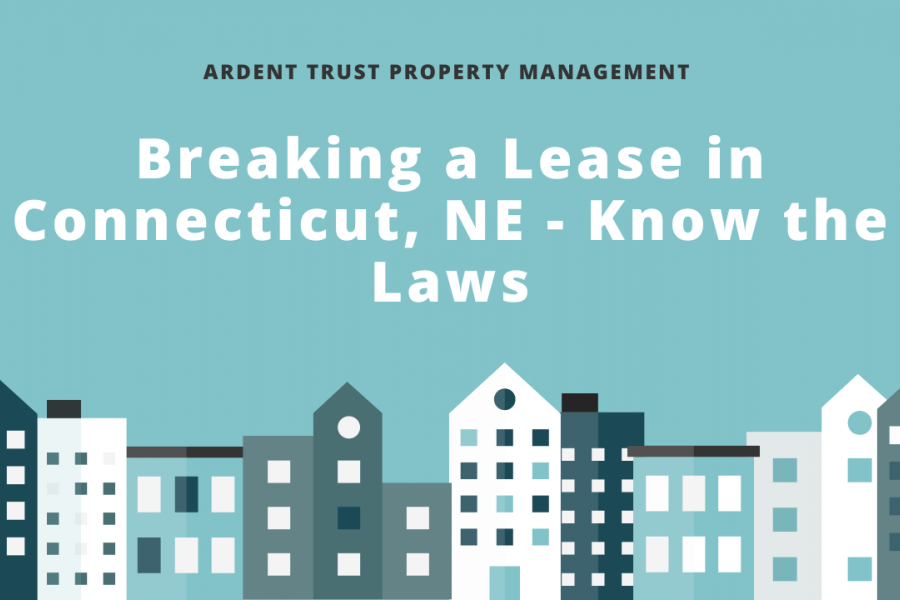
As a Connecticut landlord, you need to be aware of the rules and regulations when it comes to your right to break a lease early as well as when it is legally acceptable for tenants to break their lease or rental agreement.
In this article, we will cover unjustified and justified reasons for ending a written lease before it expires, so that you can be well informed when it comes to both your rights and your tenants’. Ending the lease early and an eviction can be similar, but they are two different things.
Rental Agreements in Connecticut
Having a rental agreement that is easy to understand is essential to the rental process. Before a tenant signs the lease agreement, a landlord must make sure they’re aware of the penalties for breaking their lease without a justifiable reason, and that they know when it is justifiable to break a lease.
The lease should also include an amount of notice a tenant should provide their landlord when ending their lease. In Connecticut, a tenant is required to give their landlord a notice of 3 days for all lease lengths including those with a fixed end date, or monthly, and weekly leases.
Connecticut landlord-tenant law requires landlords to make a reasonable effort to re-rent the unit. If the landlord manages to do so and keep the vacancy short, the tenant will only be responsible for paying rent for the time when nobody was renting the rental unit.

If a landlord doesn't allow subletting, the lease must explicitly mention this restriction. If you fail to mention it, according to Connecticut law a tenant is free to sublet the unit should they choose to.
The contract can also include a clause requiring your tenant to seek your permission before subletting. To request your approval for a sublet, the tenant must formally make the request and send it by certified mail. As a landlord, you have the right to decline the request based on reasonable factors outlined by the Fair Housing Act.
Unjustified Reasons to Break a Lease
The below reasons are generally not enough justification for a tenant to terminate their lease. They will not provide any legal protection against penalties for not honoring the lease.
- The tenant purchased a house
- The tenant is moving in with a partner
- The tenant wants to downgrade or upgrade
- The tenant is moving to be closer to loved ones
- The tenant is relocating because of a new job or school
Breaking the lease for any of the reasons listed above without court authority or in any situations not previously specified in the rental agreement can result in consequences for the renters. If a tenant wishes to break a lease for any of the reasons listed above, they should request that the landlord agree to a mutual termination.

Justified Reasons to Break a Lease
As a landlord in Connecticut, you should stay updated on the legal reasons for a tenant to break a lease early. Below, we have outlined the justified reasons for a tenant to end their lease:
Active Military Duty
Under the federal Servicemembers Civil Relief Act (SCRA), if a tenant is a member of the military and gets deployment or undergoes a permanent change of station (PCS) orders, they can break the lease without penalty. They are required to provide written notice and a copy of their orders to landlords at least 30 days in advance.
To break a lease under the relief act, a tenant must:
- Establish that the lease was signed prior to entering active duty
- Indicate that they will be on active duty for the next 90 days or more
- Deliver a written notification to the landlord, accompanied by a copy of their deployment orders / Permanent Change of Station (PCS) or a letter from their commanding officer stating their impending deployment.
Once the notification is delivered, the lease can be terminated 30 days after the beginning of the next rent period. For example, if the notice was served on June 23rd and rent is due on the 1st of each month, the earliest the lease can be terminated is August 1st, and rent is still payable for the month of July.
Domestic Violence
Tenants who are victims of domestic abuse in Connecticut are protected by special rental provisions. If your tenant is impacted by domestic abuse and wishes to relocate, it is strongly recommended to involve local law enforcement.

The following Connecticut landlord-tenant laws and statutes protect victims of domestic violence:
Early Termination Rights
If your tenant reasonably feels that vacating the premises is necessary due to imminent danger because of domestic violence or sexual assault, the tenant may terminate the lease without penalty with at least 30 days written notice.
Proof of Status
The notice of early termination must include a statement certifying that a tenant at the rental address is or has been a victim of family violence or sexual assault, as well as a copy of a police report or a copy of the court record detailing the incident.
Uninhabitable Unit
Connecticut, like most states, has health and safety requirements that provide minimum standards for rental units. If those conditions are not met, so long as tenants were able to provide sufficient notice, and repairs are still not completed within the required time frame, the renter is considered constructively evicted. If they are evicted because of negligence of an uninhabitable unit, you are not allowed to keep their security deposit to make the repairs after they leave.
As a Connecticut landlord, you are responsible for providing your tenants with a rental unit that is safe, tidy, and comfortable. This includes ensuring that the premises adheres to building and housing code requirements, including operational plumbing, heating, and electrical systems, as well as attending to any necessary repairs or maintenance issues.
Bottom Line
There are many important rules and regulations to be mindful of when it comes to breaking a lease in the state of Connecticut. For any questions about rental management, reach out to Ardent Trust Property Management.
We are a leading management company in Fairfield County and have been trusted by landlords and investors for years. We’d love to work with you, too! Contact us today by dialing 203-451-3296!
Please note that the information provided in this blog is intended for general guidance and should not be considered as a replacement for professional legal advice. It is important to be aware that laws pertaining to management may change, rendering this information outdated by the time you read it.
